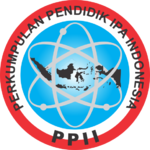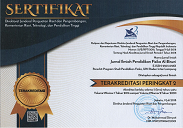Exploring the impact of project-based learning and discovery learning to the students’ learning outcomes: Reviewed from the analytical skills
Abstract
Keywords
Full Text:
PDFReferences
Astuti, M. S. (2015). Peningkatan keterampilan bertanya dan belajar siswa kelas 2 SDN Slungkep 03 menggunakan model discovery leaning. Scholaria, 5 (1), 10-23.
Aysan, E. (2015). Learning science and science education in a new era. Annals of Medicine and Surgery, 4, 158-161.
Chen, C. H., Yang, Y. C. (2019). Revisiting the effects of project-based learning on students’ academic achievement: A meta-analysis investigating moderators. Educational Research Review, 26,71–81.
Choi, J., Lee, J.H., Kim, B. (2019). How does learner-centered education affect teacher self-efficacy? The case of project-based learning in Korea. Teaching and Teacher Education, 85, 45-57.
Cruickshank D R, Jenkins D B, Metcalf K K. (2014). Perilaku Mengajar (Buku 1). Jakarta : Salemba Humanika.
Durotulaila A H, Masykuri M, Mulyani B. (2014). Pengaruh model pembelajaran react (relating, experiencing, applying, cooperating, transfering) dengan metode eksperimen dan penyelesaian masalah terhadap prestasi belajar ditinjau dari kemampuan analisis siswa. Jurnal Pendidikan Kimia, 4(3), 66-74.
Diani, R., Yuberti, & Syarlisjiswan, M. R. (2018). Web-enhanced course based on problem-based learning (PBL): development of interactive learning media for basic physics II. Jurnal Ilmiah Pendidikan Fisika Al-BiRuNi, 7(1), 105–116.
Dwyer, C. P., Hogan, M. J., & Stewart, I. (2014). An integrated critical thinking framework for the 21st century. Thinking Skills and Creativity, 12, 43-52. http://dx.doi.org/10.1016/j.tsc.2013.12.004
Figueroa, C. (2014). Developing practical/analytical skills through mindful classroom simulations for “doing” leadership. Journal of Public Affairs Education, 20(1), 113-129.
Griffin, P., Care, E. (2015). Assessment and teaching of 21st century skills: method and approach. New York: Springer.
Indriwati S E, Supiandi M I, Zubaidah S. (2016). Students’ multiple intelligences empowering to learning achievement of cognitive through plasma cluster strategy. International Journal of Academic Research and Development, 7(1), 31-36.
In'am, A., & Hajar, S. (2017). Learning geometry through discovery learning using a scientific approach. International Journal of Instruction, 10(1), 55-70.
Ismail., Indri Astuti., Aloysius Mering. (2018). Evaluation of learning outcome assessment system in health and sports physical education subject in junior high school. Journal of Education, Teaching, and Learning, 3(2): 296-301.
Kemdikbud. (2018). Hasil UN SMP/MTs Negeri Kota Surakarta. Retrieved September 27, 2018, from http://www.kemdikbud.go.id.
Laksono E W., Rohaeti E., Suyanta., Irwanto. (2017). Instrumen penilaian kemampuan analitis dan keterampilan proses sains kimia. Jurnal Kependidikan, 1(1), 100-110.
Malawati, R., Sahyar. (2016). Peningkatan keterampilan proses sains mahasiswa dengan model project based learning berbasis pelatihan dalam pembelajaran fisika. Jurnal Pendidikan Fisika, 5(1), 58-63.
Mayasari, T., Kadarohman, A., Rusdiana, D., Kaniawati, I. (2016). Apakah model pembelajaran problem based learning dan project based learning mampu melatihkan keterampilan abad 21?. Jurnal Pendidikan Fisika dan Keilmuan, 2(1), 48-55.
Morgues, C.V., M. Tan, S. Hein, K. Al-Harbi, A. Aljughaiman, E.L. Grigorenkoet. (2016). The relationship between analytical and creative cognitive skills from middle childhood to adolescence: Testing the threshold theory in the Kingdom of Saudi Arabia. ELSEVIER: Learning and Individual, 52, 137–147.
Oktaviani, B.A.Y., Mawardi, Astuti, S. (2018). Perbedaan model problem based learning dan discovery learning ditinjau dari hasil belajar matematika siswa kelas 4 SD. Scholaria: Jurnal Pendidikan dan Kebudayaan, 8(2), 132-141.
Ott, L. E., Carpenter, T. S., Hamilton, D. S., LaCourse, D.R. (2018). Discovery learning: Development of a unique active learning environment for introductory chemistry. Journal of the Scholarship of Teaching and Learning, 18(4),161-180. doi:10.14434/josotl.v18i4.23112.
Politsinsky, E., Demenkova, L., & Medvedevа, O. (2015). Ways of students training aimed at analytical skills development while solving learning tasks. Procedia - Social and Behavioral Sciences, 206, 383 – 387.
Pringle, A., & Sowden, P. T. (2017). The Mode Shifting Index (MSI): A new measure of the creative thinking skill of shifting between associative and analytic thinking. Thinking Skills and Creativity, 23, 17-28.
Revelle, K.Z. (2019). Teacher perceptions of a project-based approach to social studies and literacy instruction. Teaching and Teacher Education, 84(8), 95-105.
Rosdiana, Boleng, D.T., Susilo. (2017). Pengaruh penggunaan model discovery learning terhadap efektivitas dan hasil belajar siswa. Jurnal Pendidikan: Teori, Penelitian, dan Pengembangan. 2(8), 1060-1064.
Setiawan A. (2017). Pengaruh kemampuan analisis terhadap prestasi belajar matematika siswa ditinjau dari intellegent quotion (IQ). Numerical 1(1), 57-78.
Stover, S., & Pollock, S. (2014). Building a community of inquiry and analytical skills in an online history course. International Journal of Teaching and Learning in Higher Education, 26(3), 393-403.
Sung, & Eunmo. (2017). The influence of visualization tendency on problem-solving ability and learning achievement of primary school students in south korea. Thinking Skills and Creativity, 26, 168-175. https://doi.org/10.1016/j.tsc.2017.10.007.
Timostsuk, I., Jaanila, S. (2015). Primary teachers´ instructional behavior as related to students’ engagement in science learning. Procedia - Social and Behavioral Sciences, 197, 1597 – 1602.
Titu M. A. (2015). Penerapan model pembelajaran project based learning (PjBL) untuk meningkatkan kreativitas siswa pada materi konsep masalah ekonomi. Prosiding Seminar Nasional Pendidikan Ekonomi FE UNY“ Profesionalisme Pendidik dalam Dinamika Kurikulum Pendidikan di Indonesia pada Era MEA.” Fakultas Ekonomi UNY. Retrieved from http://eprints.uny.ac.id/21708/
Valeeva, R. A., and Bushmeleva, N. A. (2016). Forming analytical competency of higher school students. IEJME-Mathematics Education, 11(8), 3137-3148.
Weng, C., Otanga, S., Weng, A., Cox, J. (2018). Effects of interactivity in e-textbooks on 7th graders science learning and cognitive load. Computers and Education,120(5), 172-184.
Yaw, H. J Elaine & Karen Goh. (2016). Problem-based learning: An overview of its process and impact on learning. Health and Professions Education, 2(2), 75-79.
Yulianto, A., Fatchan, A., Astina, I. K. (2017). Penerapan model pembelajaran project based learning berbasis lesson study untuk meningkatkan keaktifan belajar siswa. Jurnal Pendidikan: Teori, Penelitian, dan Pengembangan, 2(3), 448-453.
DOI: http://dx.doi.org/10.24042/jipfalbiruni.v9i1.4561
Refbacks
- There are currently no refbacks.

Jurnal ilmiah pendidikan fisika Al-Biruni is licensed under a Creative Commons Attribution-ShareAlike 4.0 International License.
![]()







